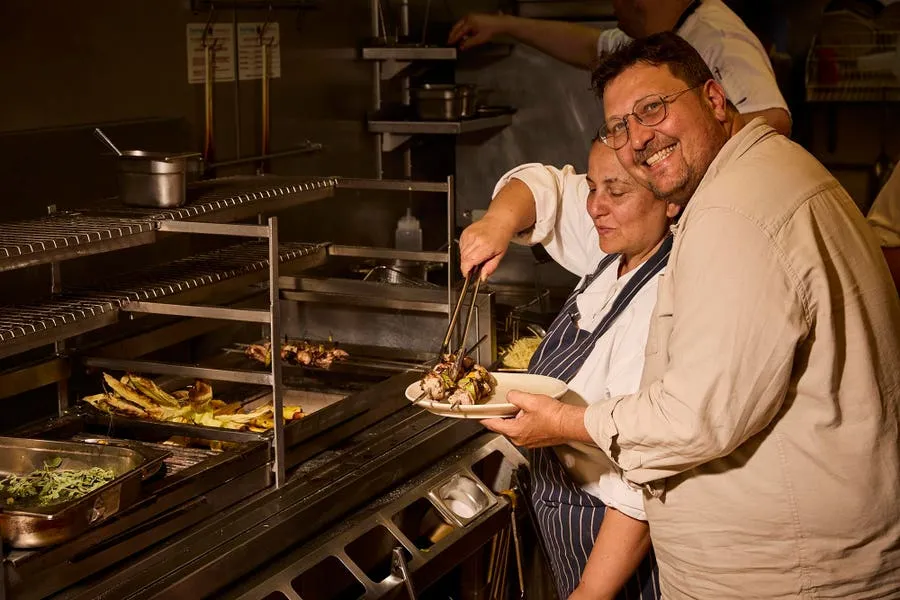Forbes contributors publish independent expert analyses and insights.
There are few things more humbling than standing over a bed of live coals trying to coax a skewer into something succulent, rather than shameful. Safe to say: barbecue brings out the best intentions and the worst results, yet Honey & Co, the grill-focused restaurant group from Sarit Packer and Itamar Srulovich, found that gap between aspiration and reality and turned it into a masterclass.
At their Fitzrovia site, Honey & Smoke, guests of their newly-launched BBQ masterclass are handed skewers, guided to the grill, and asked to do what most of us usually get wrong: cook meat over live flame with confidence. And, in doing so, make an arguably perfect business case for experiential dining at a time when restaurants are searching for revenue beyond dinner service. Here is the model, smouldering in front of you -- an experience that is intimate, instructive and, crucially, scalable.
Packer and Srulovich aren't dilettantes, either. Over the past decade they've built one of London's most recognisable restaurant brands. Honey & Co., their original Fitzrovia café, became a cult name on the strength of feta and honey cheesecakes, fragrant Israeli stews, and a warmth of hospitality that felt imported from a different dining era. Honey & Spice, their deli, expanded the reach. Honey & Smoke, the bigger sibling on Great Portland Street, gave them a stage for the grill cooking of their childhoods. Cookbooks and supper clubs extended the brand still further, making a masterclass their natural continuation. All at once: exceptional food served with education, story, and revenue.
The class is refreshingly unvarnished, too. There is no gimmickry or "chef's secrets" doled out with winks, but incredibly helpful facts and opportunities to practice everything not-so-secret secret as you go. You chop, you season, you make bread, you set skewers over coals, and you watch the chefs demonstrate the difference between letting the fire work for you and fighting against it.
As any of their cookbooks might teach you, but you may not have the personal resources or time to experience at such a scale, the details matter most: the way marinades cling, the moment the meat is ready, the kind of patience barbecue requires. In my own visit, I learned more in two hours than I had in years of reading cookbooks.
As you'd expect, many attendees are repeat visitors from the couple's supper clubs, who now treat the restaurants almost as a second home. Others were diehard fans who had eaten their way across the Honey & Co. portfolio and saw this as the logical next step (myself included). Others were complete newcomers and curious teens, yet even they spoke of the brand with a certain reverence. And that mix -- loyalists deepening their connection, new faces being folded in -- is where the business logic shines.
For the restaurant, the benefits are obvious. Classes are ticketed, so they provide an additional revenue stream in a sector where margins are notoriously tight. They feed directly into loyalty. Once you've blistered aubergines under Honey & Smoke's watch, you're far more likely to buy the book, reserve a table, or drag a group of friends back for dinner. And they double as live consumer research. Watching a roomful of people react to spice mixes and grill techniques tells you more about your market than a stack of online reviews ever could.
The context matters too. British summers are warming, and barbecue is enjoying extended cultural relevance among those of us who'd never bothered to get to grips with grilling previously. And that has a lot to teach other restaurants.
Few will succeed at home -- and that, ironically, is the genius. The harder the skill, the more loyal the student becomes to the teacher.
As an expert in the restaurant industry, I truly believe the future of hospitality will be shaped as much by education as by service. Not all in this way, sure, but diners want to understand what they're eating and go home with knowledge as much as they do brilliant memories.
For restaurants, that means thinking in ecosystems rather than isolated transactions. A supper club feeds into a cookbook, which feeds into a class, which feeds back into the restaurant. Each layer strengthens the next.
What sets Honey & Smoke apart is its balance of authority and accessibility. Guests know they are in capable hands, but nothing ever tips into intimidation. Even as a diner, you feel part of the process, not merely an observer. That inclusivity is why it works as both theatre and business.
This isn't a global franchise with branded spice rubs in every supermarket -- at least not yet -- but it is a flawless case study in how to extend a restaurant brand beyond the dining room.
